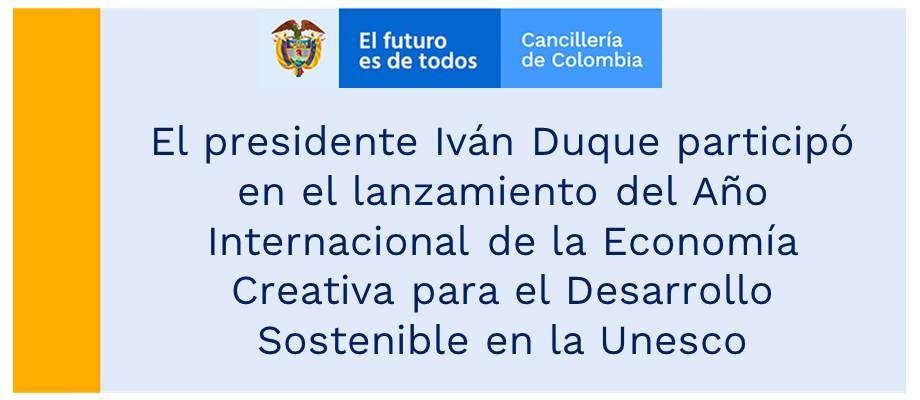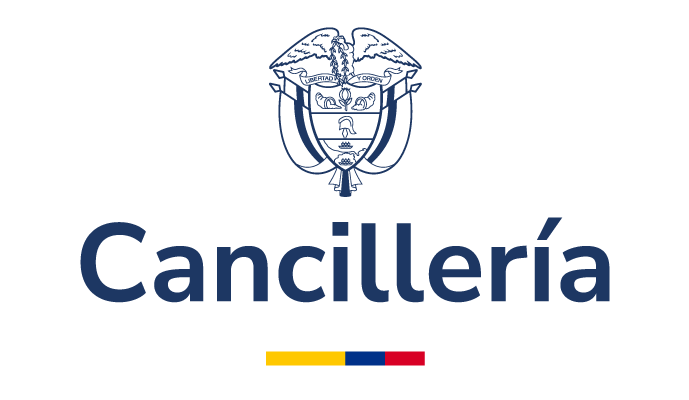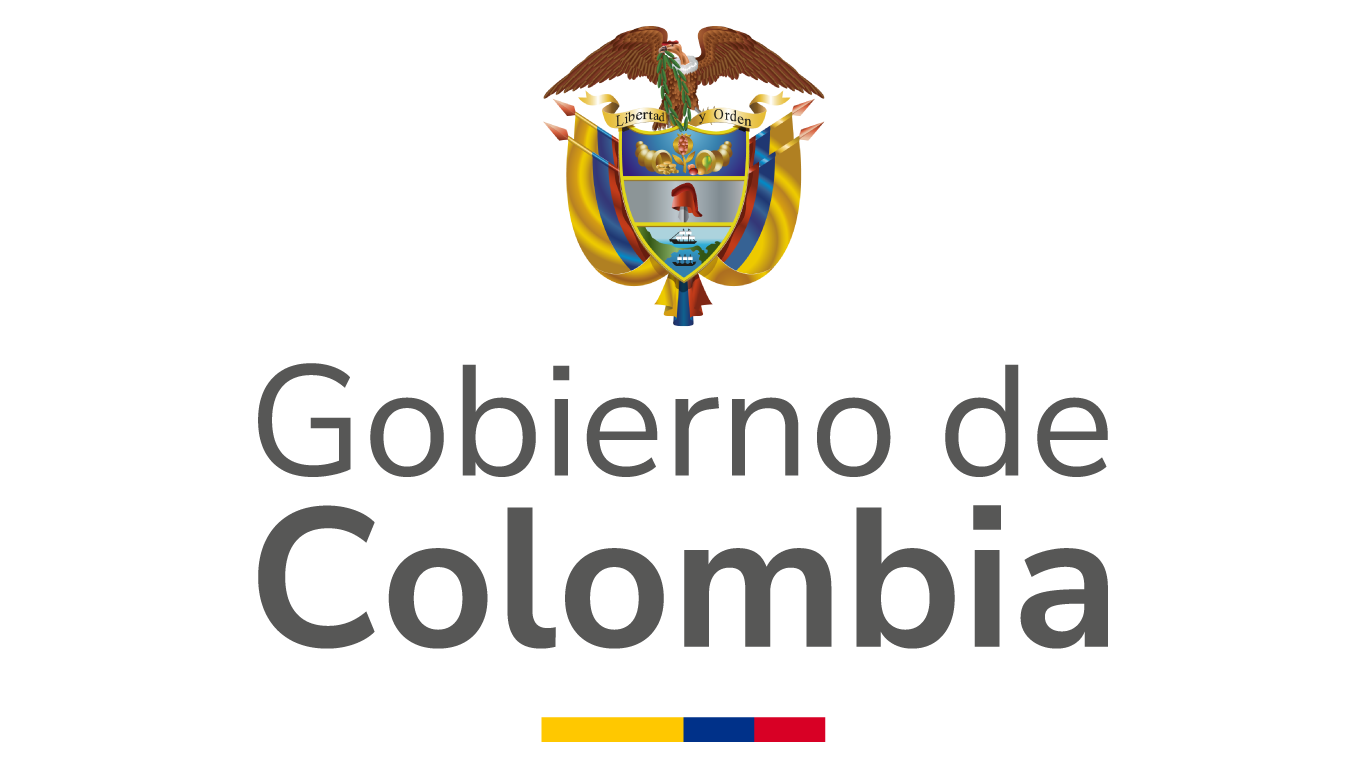
“Ahora que debemos recuperarnos a nivel económico y social, con el principio de no dejar a nadie atrás, debemos tener la economía creativa como protagonista desde cada uno de los países, articulados con la Convención de la UNESCO de 2005 y la Agenda 2030”.
Iván Duque Márquez, presidente de la República de Colombia
El presidente Iván Duque Márquez presidió en el lanzamiento del Año Internacional de la Economía Creativa para el Desarrollo Sostenible, llevada a cabo en formato virtual en el marco de la UNESCO como preámbulo a la apertura de la 14ª sesión del Comité Intergubernamental de la Convención para la Protección y Promoción de la Diversidad de las Expresiones Culturales, realizada entre los días 1 y 6 de febrero de 2021.
El mensaje del presidente se unió a las palabras del presidente de la 75ª sesión de la Asamblea General de Naciones Unidas, a la Vice - Secretaria General de la UNCTAD, el Director de Urbanismo del Banco Mundial y al Subdirector General para el Sector Cultura de la UNESCO.
El presidente recordó el papel fundamental que jugaron las industrias culturales durante la pandemia y la importancia de actualizar las instituciones culturales con las lecciones aprendidas durante la crisis sanitaria. Reiteró también el protagonismo de la economía naranja para la reactivación económica de Colombia, de la mano con la implementación de la Convención de 2005 de la UNESCO y la Agenda 2030 para el Desarrollo Sostenible. Asimismo, recalcó el liderazgo de Colombia en la región en los procesos de circulación e integración cultural con diferentes programas, desde las presidencias pro tempore de la CAN, de la Alianza del Pacífico y de Prosur.
Finalmente, mencionó el reto de consolidar la descentralización y modernización de la cultura durante el presente año, así como la reactivación del sector Cultura en Colombia mediante la Ley ReactivArte. “La Economía Naranja es un bien público la sociedad y 2021 debe ser un año para integrar nuestras sociedades a partir de la cultura, la creatividad y la innovación”, afirmó.
Consulte aquí el video completo de la intervención del presidente Duque.
Colombia, en tanto miembro del Comité, contó con la participación del Ministro de Cultura, Felipe Buitrago, quien resaltó la entrega en 2020 del reporte cuadrienal de la implementación de la Convención en Colombia, que ha permitido a su vez que la economía naranja sea vista como el principal motor del desarrollo social y económico. Resaltó también la elaboración del estudio sobre “La participación de las mujeres en el sector cultural en Colombia con especial énfasis en los subsectores audiovisual y editorial” y la realización del Foro Global de Arte, Cultura, Creatividad y Tecnología G-FACCT, que ha tenido dos versiones consecutivas y que contó con una audiencia de personas de 83 países y con la participación de más de 400 expertos participantes.
Por último, en materia de cooperación para la sostenibilidad de la protección y promoción de la diversidad de expresiones culturales, el ministro señaló que Colombia ha tenido importantes avances en la agenda con diferentes países a través de espacios multilaterales e internacionales como la Alianza del Pacífico, la CAN o Comunidad Andina y la Comisión Interamericana de Cultura de la OEA.
Intervención del ministro de Cultura, Felipe Buitrago, con ocasión de la 14 sesión del Comité Intergubernamental para la Protección y Promoción de la Diversidad y las Expresiones Culturales
I want to congratulate the Secretariat for the progress and achievements made in recent years in the implementation of the 2005 Convention and for its commitment to placing culture as an essential matter in the 2030 Agenda.
For the Government of Colombia, the 2005 Convention has become of pivotal importance. It has allowed us to convene around its implementation all of the actions the Colombian government has taken towards a comprehensive policy for Orange Economy, which is no different than the implementation of the objectives of the Convention at a national but also municipal, public and private levels. If in 2017 we had the opportunity to deliver a periodic report conveying the rightful decisions of the Ministry of Culture of Colombia regarding cultural policy and the implementation of the Convention, it is now clear that the recent delivery of the four-year periodic report of Colombia is an extensive mapping allowing the Government of Colombia in full, this time, to enunciate the efforts that seven ministries and five administrative departments are doing for culture. We are a nation that strongly believes in the creative economy and the 2005 Convention has allowed us, as a country, to align a vision and present it to the world through UNESCO.
I take the opportunity to thank the Secretariat and the Swedish Cooperation Agency –ASDI, for the support and contributions they have provided to Colombia in the preparation of the First and Second Periodic Report, that the country has presented in 2017 and 2020. Thanks to this support, the country has managed to disseminate and make visible the measures, actions and norms adopted in cultural matters to comply with the 2005 Convention and so that the Orange / Creative Economy is seen as the main driver of social and economic development.
I would also like to share with you one of our last year’s achievements: the preparation of the study on “The participation of women in the cultural sector in Colombia with a particular focus on the audiovisual and publishing subsectors”. This document will be certainly the essence to design actions and decisions based on evidence to promote and guarantee gender equality in the cultural industries.
On the other hand, we wish to highlight the commitment of the Secretariat to involve civil society in the implementation of the Convention, through the ResiliArt movement. These spaces for dialogue and reflection, have been of utmost importance in the current context. Artists, creators and cultural agents have found in ResiliArt a channel to express their concerns and needs, but also propose actions to keep promoting the creative and cultural industries.
On a last note, in response to one of the objectives of the 2005 Convention regarding cooperation for the sustainability of the protection and promotion of the diversity of cultural expressions, Colombia has major advancements in the agenda with different countries through multilateral and international spaces such as the Pacific Alliance, the CAN or Andean Community and the Inter-American Committee on Culture of the OAS; In these spaces, the Orange Economy was included in the operational plans as a transversal line of work. Specific actions were agreed upon to open new opportunities to promote the culture and creativity for the future times, that we are now calling “the new normal”.
One of these initiatives is the Global Forum on Arts, Culture, Creativity and Technology G-FACCT / Orange Economy Summit, which has had two consecutive versions. The latest version, in November 2020, had an audience of 2,500,000 people from 83 countries, more than 400 participating experts, 105 conferences and panels and 22 spaces on the multilateral agenda with the collaboration of Unesco, the IDB, CERLALC, SEGIB, Mercosur Cultural, CAACI, various international mechanisms and several United Nations agencies such as the Office for South-South Cooperation UNOSSC, UNDP, IOM and UN Women.
By 2021, and as part of the actions that will be developed within the framework of the International Year of the Creative Economy, we will have a third version of the G-FACCT from September 8 to 11, in which of course we hope to have the support and participation of UNESCO and all the States Parties to the 2005 Convention.
From Colombia we invite you to continue working to achieve the Sustainable Development Goals through the exchange of experiences, knowledge and lessons learned in the Orange Economy and to continue to join forces for the development of actions and concrete projects towards the promotion and protection of the cultural expressions of our countries.








